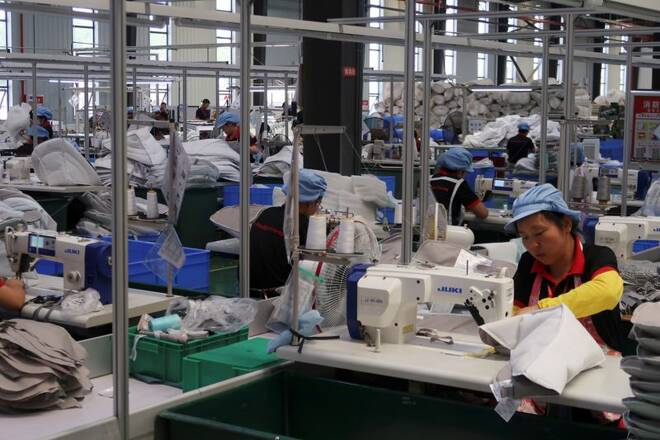Advertisement
Advertisement
China’s faltering March factory activity weighs on GDP outlook
By:
BEIJING(Reuters) - China's factory activity growth stalled in March, weighed by slowing production and weaker global demand and adding to uncertainty about a post-COVID recovery, a private sector survey showed on Monday.
By Liangping Gao and Ryan Woo
BEIJING (Reuters) – China’s sprawling manufacturing sector, accounting for a third of the world’s second-largest economy by value, lost momentum in March amid still-weak export orders, tapping the brakes on the country’s economic recovery from restrictive COVID-19 policies.
The Caixin/S&P Global manufacturing purchasing managers’ index (PMI) fell to 50.0 in March. That followed February’s reading of 51.6, which indicated the first monthly activity expansion in seven months.
The survey results, released on Monday, were well below expectations of 51.7 in a Reuters poll and echoed slower growth in an official PMI released on Friday. The 50-point index mark separates growth from contraction on a monthly basis.
China’s economy showed signs of a recovery in the first two months of the year, led by a pickup in services after the end of three years of strict COVID policies that had disrupted commerce and muzzled domestic demand.
But a convincing manufacturing rebound has been lacking, dragging on the economy’s near-term outlook. ING Group on Monday slashed its first-quarter gross domestic product (GDP) forecast to 3.8% annual growth from 4.5%, citing slower external demand.
“The recovery is not smooth and we note that external demand is still fragile, which could pose a risk to domestic demand,” the Dutch bank said in a research note.
Beijing has set a modest target for economic growth this year of about 5% after it grew by just 3% last year, one of the weakest showings in nearly half a century.
China’s GDP is likely to have grown around 4.0% year-on-year in the first quarter as consumption picked up and infrastructure investment maintained a high pace of growth, state-owned financial newspaper The Securities Times reported on Monday.
“The next few months are likely to see weak external demand and a recovery in domestic demand,” said Nie Wen, a Shanghai-based economist at investment firm Hwabao Trust.
However, Nie expects GDP data to mostly reflect the strength seen in manufacturing and services at the start of the year and raised his first-quarter forecast to 3.7% annual growth from 3.5% previously.
In March, the new export orders sub-index fell to 49.0 after briefly swinging into growth in February, suggesting global demand remains weak, according to the Caixin survey.
“The relatively modest and short-lived pick-up in the manufacturing PMIs in the first quarter suggests that the industrial sector has only received a limited boost from reopening,” Capital Economics wrote in a note.
“This is partly due to a weaker global backdrop, but it is also consistent with our view that most of the reopening recovery will come from the services sector which was hardest hit by the zero-COVID policy.”

Rebound doubts
A property downturn and global financial uncertainty have also raised doubts about the strength of China’s rebound.
“The foundation for economic recovery is not yet solid. Looking forward, economic growth will still rely on a boost in domestic demand, especially an improvement in household consumption,” said Wang Zhe, senior economist at Caixin Insight Group.
Official data on Friday showed activity in the services sector expanded at its fastest pace in nearly 12 years.
Caixin/S&P Global services purchasing managers’ index (PMI), mostly tracks small and medium-sized private-owned enterprises, will be released on Thursday.
China’s new premier Li Qiang last week vowed to support consumption and investment. The central bank also lowered the reserve requirement ratio last month.
“The new economic team is officially taking over, we will likely see more pro-business policies going forward, even though our expectation for stimulus is low,” Citi said in a research note.
(Reporting by Liangping Gao and Ryan Woo; Editing by Sam Holmes and Jamie Freed)
About the Author
Reuterscontributor
Reuters, the news and media division of Thomson Reuters, is the world’s largest international multimedia news provider reaching more than one billion people every day. Reuters provides trusted business, financial, national, and international news to professionals via Thomson Reuters desktops, the world's media organizations, and directly to consumers at Reuters.com and via Reuters TV. Learn more about Thomson Reuters products:
Did you find this article useful?
Latest news and analysis
Advertisement
